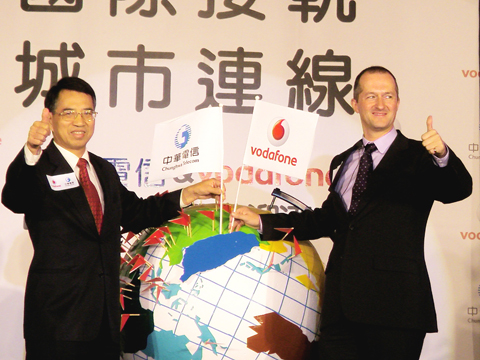Chunghwa Telecom Co (中華電信) said yesterday it was in talks with Vodafone about joining its handset procurement program and extending cooperation in international roaming services.
Starting next month, the nation’s top telecom operator will provide a discount of about 30 percent to international roaming services for its mobile subscribers and those of Vodafone when they travel to 17 countries in Europe as well as Australia and New Zealand, the two firms announced in Taipei.
The pact makes Chunghwa Telecom Vodafone’s eighth partner in Asia. Vodafone is the world’s biggest mobile operator by revenue.

PHOTO: WANG YI-HUNG, TAIPEI TIMES
“International roaming is only a beginning of our cooperation with Vodaofne. We are looking for the opportunity of purchasing end user products [handsets], or network equipment to reduce cost,” Chunghwa Telecom chairman Lu Shyue-ching (呂學錦) told a media briefing.
“We hope this to be done as soon as possible,” Lu said.
Chunghwa Telecom has 9.2 million mobile users, a 35 percent share of the nation’s mobile market.
“There are a lot of good suppliers in Taiwan and perhaps we can introduce them to our partners,” Lu said in response to a Taipei Times’ question on whether HTC Corp (宏達電) would be on the short list because it is the world’s biggest maker of cellular phones running on Microsoft Corp’s system.
HTC has long been a major mobile phone supplier for both Chunghwa Telecom and Vodafone.
Chunghwa Telecom has set up a special task force, with members from both companies, to review the feasibility of it joining Vodafone’s global procurement program.
Richard Daly, Vodafone’s chief executive for global market cooperation, said that his company was able to bring its partners both buying power and the advantages of its buying operations, which would result in improving pricing and improving profitability.
Vodafone, which has 300 million subscribers, has strong bargaining power because of its huge scale and huge geographic footprint, he said.
He declined, however, to reveal the volume of its annual handset purchases and said there was no timetable for the two firms to deepen their cooperation.
Vodafone has no plan to invest in Chunghwa Telecom, as the company has changed its strategies of aggressive expansion overseas via equity investment, he said.
With the improving economy in Taiwan, Chunghwa Telecom said it planned to increase by about 11 percent its purchase of handsets from 1.8 million this year to 2 million next year.

SEMICONDUCTORS: The firm has already completed one fab, which is to begin mass producing 2-nanomater chips next year, while two others are under construction Taiwan Semiconductor Manufacturing Co (TSMC, 台積電), the world’s largest contract chipmaker, plans to begin construction of its fourth and fifth wafer fabs in Kaohsiung next year, targeting the development of high-end processes. The two facilities — P4 and P5 — are part of TSMC’s production expansion program, which aims to build five fabs in Kaohsiung. TSMC facility division vice president Arthur Chuang (莊子壽) on Thursday said that the five facilities are expected to create 8,000 jobs. To respond to the fast-changing global semiconductor industry and escalating international competition, TSMC said it has to keep growing by expanding its production footprints. The P4 and P5

DOWNFALL: The Singapore-based oil magnate Lim Oon Kuin was accused of hiding US$800 million in losses and leaving 20 banks with substantial liabilities Former tycoon Lim Oon Kuin (林恩強) has been declared bankrupt in Singapore, following the collapse of his oil trading empire. The name of the founder of Hin Leong Trading Pte Ltd (興隆貿易) and his children Lim Huey Ching (林慧清) and Lim Chee Meng (林志朋) were listed as having been issued a bankruptcy order on Dec. 19, the government gazette showed. The younger Lims were directors at the company. Leow Quek Shiong and Seah Roh Lin of BDO Advisory Pte Ltd are the trustees, according to the gazette. At its peak, Hin Leong traded a range of oil products, made lubricants and operated loading

The growing popularity of Chinese sport utility vehicles and pickup trucks has shaken up Mexico’s luxury car market, hitting sales of traditionally dominant brands such as Mercedes-Benz and BMW. Mexicans are increasingly switching from traditionally dominant sedans to Chinese vehicles due to a combination of comfort, technology and price, industry experts say. It is no small feat in a country home to factories of foreign brands such as Audi and BMW, and where until a few years ago imported Chinese cars were stigmatized, as in other parts of the world. The high-end segment of the market registered a sales drop

Citigroup Inc and Bank of America Corp said they are leaving a global climate-banking group, becoming the latest Wall Street lenders to exit the coalition in the past month. In a statement, Citigroup said while it remains committed to achieving net zero emissions, it is exiting the Net-Zero Banking Alliance (NZBA). Bank of America said separately on Tuesday that it is also leaving NZBA, adding that it would continue to work with clients on reducing greenhouse gas emissions. The banks’ departure from NZBA follows Goldman Sachs Group Inc and Wells Fargo & Co. The largest US financial institutions are under increasing pressure